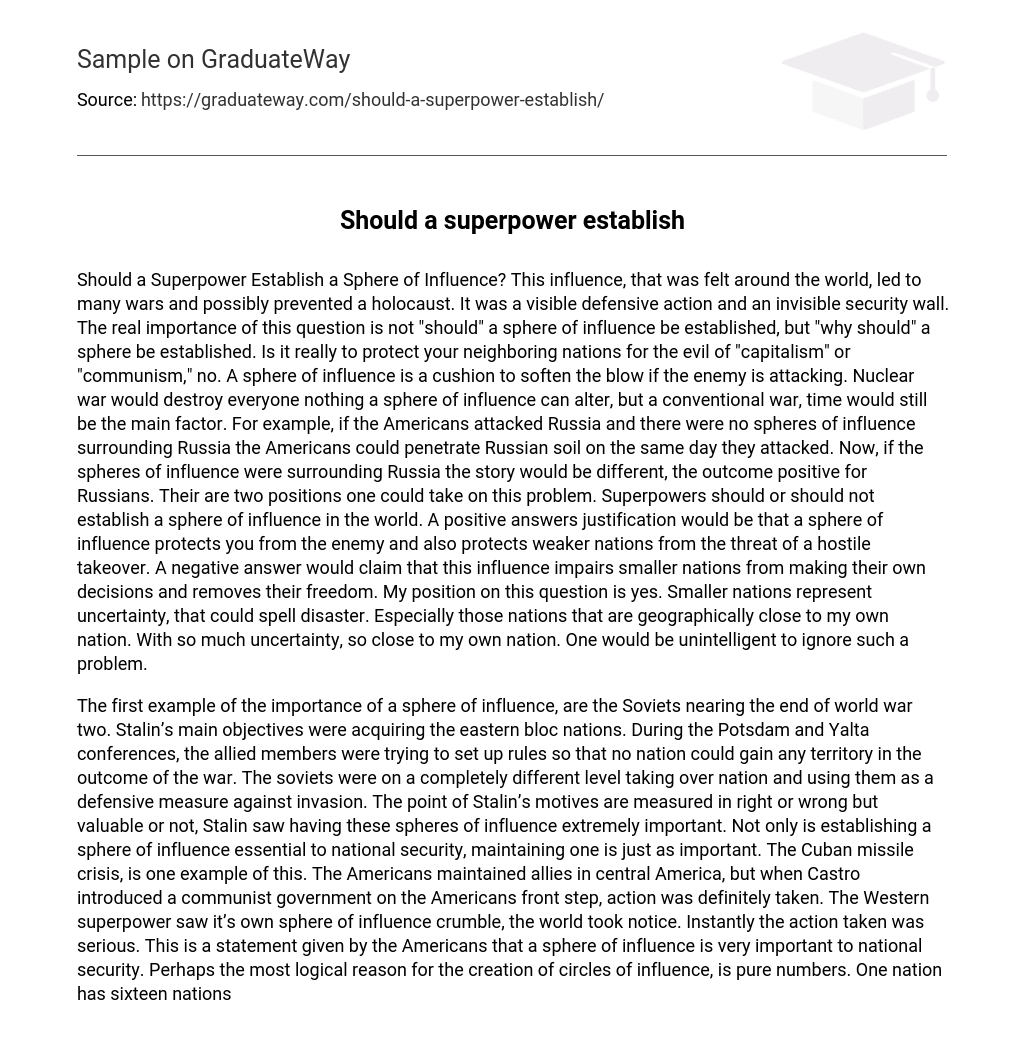Should a Superpower Establish a Sphere of Influence? This influence, that was felt around the world, led to many wars and possibly prevented a holocaust. It was a visible defensive action and an invisible security wall. The real importance of this question is not “should” a sphere of influence be established, but “why should” a sphere be established. Is it really to protect your neighboring nations for the evil of “capitalism” or “communism,” no. A sphere of influence is a cushion to soften the blow if the enemy is attacking. Nuclear war would destroy everyone nothing a sphere of influence can alter, but a conventional war, time would still be the main factor. For example, if the Americans attacked Russia and there were no spheres of influence surrounding Russia the Americans could penetrate Russian soil on the same day they attacked. Now, if the spheres of influence were surrounding Russia the story would be different, the outcome positive for Russians. Their are two positions one could take on this problem. Superpowers should or should not establish a sphere of influence in the world. A positive answers justification would be that a sphere of influence protects you from the enemy and also protects weaker nations from the threat of a hostile takeover. A negative answer would claim that this influence impairs smaller nations from making their own decisions and removes their freedom. My position on this question is yes. Smaller nations represent uncertainty, that could spell disaster. Especially those nations that are geographically close to my own nation. With so much uncertainty, so close to my own nation. One would be unintelligent to ignore such a problem.
The first example of the importance of a sphere of influence, are the Soviets nearing the end of world war two. Stalin’s main objectives were acquiring the eastern bloc nations. During the Potsdam and Yalta conferences, the allied members were trying to set up rules so that no nation could gain any territory in the outcome of the war. The soviets were on a completely different level taking over nation and using them as a defensive measure against invasion. The point of Stalin’s motives are measured in right or wrong but valuable or not, Stalin saw having these spheres of influence extremely important. Not only is establishing a sphere of influence essential to national security, maintaining one is just as important. The Cuban missile crisis, is one example of this. The Americans maintained allies in central America, but when Castro introduced a communist government on the Americans front step, action was definitely taken. The Western superpower saw it’s own sphere of influence crumble, the world took notice. Instantly the action taken was serious. This is a statement given by the Americans that a sphere of influence is very important to national security. Perhaps the most logical reason for the creation of circles of influence, is pure numbers. One nation has sixteen nations surrounding them, while the other has three. Balance of power, also comes into effect. Each superpower wants its opposing team to believe that it is more powerful then the other member. Both superpower nations strictly controlled the level of influence in the smaller nations and believed in eliminating the effect of the opposing team.
In conclusion, I believe that the sphere of influence greatly effected the manner in which the two superpowers handled themselves in the cold war. A sense of equality developed, along with respect that was proven throughout the cold war. The ability to control nations greatly appealed to the superpowers and their was no lack of smaller nations to control, regardless if they wanted to join. The most logical reason, to add numbers to your allies list, for security and prestige. Spheres of influence still exist today, but are not emphasized to the extent they were in the cold war. Perhaps the most logical reason for the creation of circles of influence, is pure numbers. One nation has sixteen nations surrounding them, while the other has three. Balance of power, also comes into effect. Each superpower wants its opposing team to believe that it is more powerful then the other member. Both superpower nations strictly controlled the level of influence in the smaller nations and believed in eliminating the effect of the opposing team.
In conclusion, I believe that the sphere of influence greatly effected the manner in which the two superpowers handled themselves in the cold war. A sense of equality developed, along with respect that was proven throughout the cold war. The ability to control nations greatly appealed to the superpowers and their was no lack of smaller nations to control, regardless if they wanted to join. The most logical reason, to add numbers to your allies list, for security and prestige. Spheres of influence still exist today, but are not emphasized to the extent they were in the cold war.





